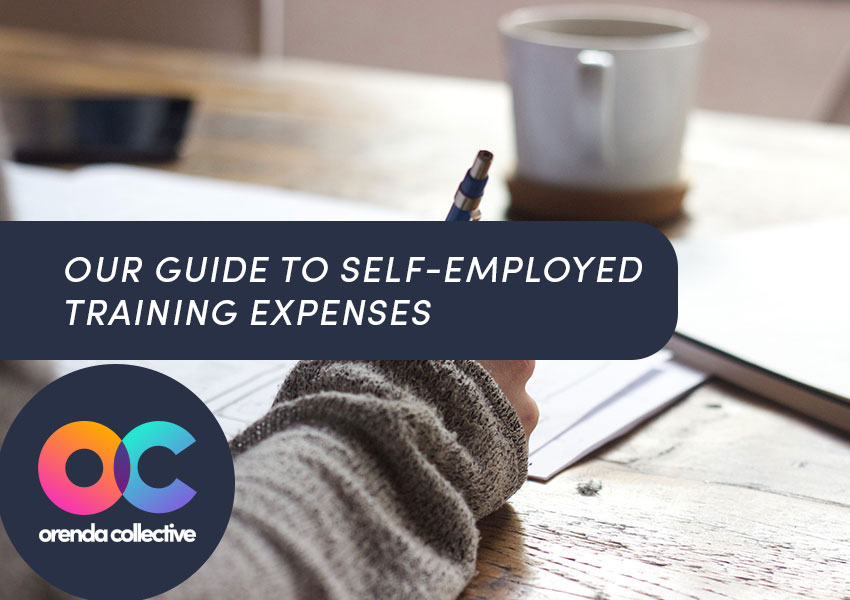
Can you expense training costs when self-employed or a sole-trader?
We get lots of questions when it comes to understanding what expenses you can offset against your income as self-employed, and training costs is often one people find confusing. In this guide we are going to provide you with an overview of training costs and the tax implications to help you make decisions for your business.
Can I include training costs as a tax deductible expense if I am self-employed?
The tax deductibility of training costs depends on whether the expense is considered to be training for a new skill or specialism or whether it is updating current skills and professional expertise, for example, continuing professional development (CPD).
CPD and skill updating is generally allowable for self-employed, whereas training for a new specialism or qualification is generally not allowable.
HMRC state:
Provided it is incurred wholly and exclusively for the purposes of the trade carried on by the individual at the time the training is undertaken, expenditure on training courses attended by the proprietor of a business (either as a sole trader, or in partnership with others) with the purpose of updating their skills and professional expertise is normally revenue expenditure, which is deductible from the profits of the business.
In considering the question of purpose, you should not take an unduly narrow view of whether the content of any particular course only updates existing skills of the individual. But if it is clear that, for example, a completely new specialisation or qualification will be acquired as a result of the expenditure, it is unlikely that the expenditure will be wholly and exclusively for the purposes of the existing trade.
Expenditure incurred by the proprietor of a business on training courses for themselves is revenue expenditure if the course merely updates existing expertise or knowledge. Expenditure on a course which provides new expertise or knowledge is capital.
We are going to explain in more detail what training costs can be defined as, the types of training costs that exists and which of these are allowable to offset against your income as self-employed to get to your taxable profits.
What are training costs?
Training costs consist of courses, seminars, webinars and CPD. We can usually put training costs into two buckets:
1) Training for a new skill or specialism (often where a qualification is gained)
For example, you were a hairdresser and you decide to train to become a Personal Trainer. This would be considered a new specialisation and qualification and not linked to your current trade, therefore not tax deductible.
2) Updating skills or expertise (CPD)
Training to update skills within your current trade, for example you are a hairdresser and you attend a course to learn a new colouring technique available. This would be considered tax deductible as its updating a skill used and linked to your current trade.
What is included as training for a new specialism or qualification for a self-employed individual?
Training for a new specialism or qualification falls into bucket 1 above and these costs are generally not deductible for tax purposes. According to HMRC you cannot claim for training courses if they are in relation to:
- A new trade or business
- Expanding into new areas of business, including anything not related to your current trade, for example, if you are currently a personal trainer and you train to teach Yoga this would be considered a new area of business.
What counts as updating skills/CPD?
Updating skills means growing or expanding skills you currently already possess or use within your business.
CPD is a term used to describe the learning activities professionals engage in to develop and enhance their abilities. For tax purposes CPD training costs are generally deductible for tax purposes.
According to HMRC ‘You can claim allowable business expenses for training that helps you improve the skills and knowledge you use in your business (for example, refresher courses)’.
For example, if you are a photographer and you attend a course to improve your knowledge in Photography lighting this would count as CPD and is tax deductible.
What is the tax impact?
What does allowable and disallowable mean?
Training for a new skill or specialism is generally not allowable from a tax perspective meaning you cannot offset this expense against your income when calculating your taxable profit.
Skill updating or CPD is generally an allowable expense from a tax perspective, meaning you can offset this expense against your income when calculating your taxable profit. Here is an example:
Income for the year – £10,000
New skill course – £2,000
CPD course – £1,500
For tax you can reduce your income by the CPD amount but not the new skill course, so:
£10,000 – £1,500 = £8,500 = Taxable Profit
You will only be taxed on the £8,500.
What about costs connected to my training course?
It is also worth highlighting that some costs incurred as a result of your ‘CPD/updating skills’ course are also allowable for tax relief, and these include:
- Public transport
- Parking
- Congestion charges and tolls
- Hotel accommodation if you have to stay overnight
- Subsistence (food and drink)
- Business telephone calls and printing costs
An exception to the above is that you can’t claim for travel if the training is taking place at your usual place of work.
Associated training costs, such as books may also be claimed, as long as the training costs themselves are allowable.
Conclusion:
Generally training costs that allow you to start trading or providing a new skill or qualification are not allowable. Whereas training that enhances a current skill you use within your trade is allowable.
We understand this is a complex area with judgement involved so do not hesitate to ask us questions. Our number one rule for clients is ‘No question is a silly question’!
Related questions:
What is a dual purpose expense?
As a sole trader there are some expenses that may fall under ‘dual purpose’ expenses, for example if you have a mobile phone that is used for both business and personal use. You are able to expense the proportion that relates to business use, for example, you could use your phone 60% personal use and 40% business use, you would be able to then claim 40% of the phone cost as a deductible expense against your profits.
We always recommend checking with your accountant before claiming though.
What are Capital Allowances?
Capital allowances can be claimed for assets that you have bought for use over the longer term within the business, such as a laptop. You are often able to claim ‘Annual Investment Allowance’ in the year that you buy the item to save tax in the year of acquisition, rather than over the life of the asset. The rules around capital allowances are complex and we always recommend checking with an accountant like The Orenda Collective.
First time here?
We have also created some other useful content to help you in your business:

